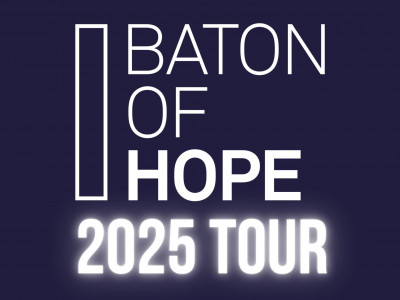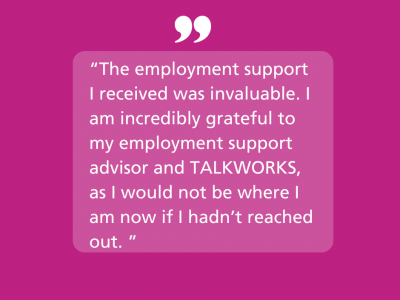- Home
- Anxiety
- Depression
- Emotional Eating
- Living With a Long Term Health Condition
- Loneliness
- Menopause
- Mindfulness
- OCD
- Panic Attacks
- Phobias
- Pregnancy & Parenthood
- Prolonged Grief (Grieving)
- PTSD
- Sleep Difficulties
- Stress
- Veterans mental health
- Needs We Can and Cannot Meet
- Cognitive Behavioural Therapy (CBT)
- Eye Movement Desensitisation & Reprocessing (EMDR)
- Employment Support
- Counselling for Depression
- Online Self-help
- Mindfulness
- Wellbeing Workshops
- Join the team
- Become a volunteer
- What to expect at your first appointment
- Testimonials
- Learn about mental health
- FAQs
- Mental Health Resources
- Blog
- Video Appointments
- Supporting someone through TALKWORKS: A guide for carers and loved ones
- Your feedback
- Making contact if you are deaf
- I need help now
Access support from TALKWORKS
Self-refer to TALKWORKSAccess support from TALKWORKS
Self-refer
Creating positive New Year’s Resolutions for 2022
It’s that time of year again! As the nights draw in we start to reflect on the year that’s been and look hopefully to the New Year ahead. The last couple of years have been difficult for many and I think we’re all hoping that 2022 might bring a bit more positivity. Although we can’t always control what’s going on in the world around us, one thing that we can have some control over is our New Year’s Resolutions.
Love them or hate them, New Year’s Resolutions can be good for improving our mental health and wellbeing. Setting goals can give us a sense of purpose and can help us to develop positive habits that may improve our life in lots of different ways. It can however be hard keeping your New Year’s resolutions and not breaking them.
Why can it be difficult to stick to your New Year’s Resolutions?
We know that New Year’s Resolutions can be really hard to follow and actually maintain. According to YouGov.co.uk, nearly a quarter of Brits who made a New Year’s Resolution in 2020 did not stick to it. Sound familiar? There are a few different reasons why New Year’s Resolutions can be hard to follow. Take a look at our top tips for how you can create positive New Year’s resolutions that you can easily stick to.
How can we stay on track with our New Year’s Resolutions?
MAKE YOUR GOAL MANAGEABLE: Although having long term goals can be positive, we are more likely to struggle with goals that are very strict, unrealistic or unmanageable. If we set a goal that is too big that feels impossible we end up feeling disheartened and give up. If you have a big long term goal try to break this down into smaller steps to help it feel more realistic and manageable.
BE SPECIFIC IN WHAT YOU WANT TO ACHIEVE: Another common problem is that we may set goals or resolutions that are too vague. If we are specific with what we want to achieve, we are more likely to be able to stick to our goals and resolutions.
ENSURE YOU ARE ACCOUNTABLE: If we’ve had a busy week or have ended up abandoning our New Year’s Resolution, it can be easy to forget about the goal we had set. Making a note of the Resolution somewhere visible so that it can’t be ignored – e.g. as a reminder on your phone – is a great way to ensure you stay on track. Another way of keeping ourselves accountable is to set some time aside (maybe 5 minutes a week or month) to review our progress. This gives us the opportunity to do a number of things: pat ourselves on the back if we’ve done well or make the goal more manageable or specific if we’ve struggled. It can also be helpful to share any goals or resolutions with friends, family or colleagues as our peers often provide us with support or encouragement which can help us keep our New Year’s Resolutions going.
DON’T GIVE UP: We can all be guilty of adopting an ‘all or nothing’ mentality from time to time, where if we slip up or make a mistake, we don’t bother to get back on track. Rather than be hard on yourself or give up altogether, it’s important to remember that it if you do go off track, you can still get back to where you were. When you’re making a big adjustment, you should allow yourself some wiggle room, and to be compassionate to yourself through recognising the effort you are putting in.
REALISTIC: Setting too many New Year’s Resolutions can also make them difficult to stick to. If we’re trying to exercise more often, eat healthily, stop smoking, reduce drinking, save money and do more of our hobby we’re going to be exhausted, and probably, grumpy! It will start to feel overwhelming, and if we drop the ball on something, we will feel deflated and stop bothering with our goals. Try to identify one or two goals that are important to you, make sure they are concrete and manageable, and then write them on the calendar or in the notes section of your phone.
How can TALKWORKS help?
If putting your mental health and wellbeing first is your New Year’s Resolution, our talking therapists can help you to achieve your goals. Whether you need help improving your sleep, reducing your stress or need support with anxiety, our clinicians will work with you to find a form of therapy that works for you. Whatever treatment and therapy you need, TALKWORKS is here to help you live better and get more out of life.
Related Posts

World Suicide Prevention Day
Posted by Victoria Walmesley on 10 September, 2025

Anon gives thanks to the employment support team
Posted by Admin on 8 September, 2025

